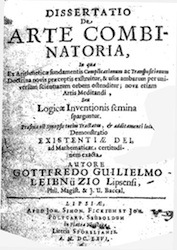Getting Started


Leibniz led a long and busy life, dedicated to a dizzying array of projects. For most of his adult life he was employed as a librarian, historian and legal advisor by the ducal (later electoral) house of Hanover. He frequently complained that his duties at the court prevented him from making as much progress in philosophy and mathematics as he might have. But progress he made—at least if judged by his literary output. The best biography covering the full range of Leibniz's activities is:
Leibniz: An Intellectual Biography, by Maria Rosa Antognazza (Cambridge, 2008).
Leibniz's most famous work is a short summary of his philosophy, unpublished during his life, which later editors gave the title Monadology. A version of this work is available on the Translations page. One of the most difficult aspects of studying Leibniz's philosophy is that he produced no single text that sums up his thought. Instead, his ideas are contained in hundreds of short essays, notes and letters, written over a forty-year period. For a representative sample of his writings in English translation, a good place to begin is:
G. W. Leibniz, Philosophical Essays, ed. and trans. Roger Ariew and Daniel Garber (Hackett, 1989).
An excellent overview of Leibniz's philosophy by Brandon Look is available online at the Stanford Encyclopedia of Philosophy. At the same site one will also find a collection of more specialized articles on aspects of his philosophy.
Advanced English-language Sources
Original Language Texts
The following are some of the most important print editions of Leibniz's writings in English:
New Essays on Human Understanding. Ed. and trans. Peter Remnant and Jonathan Bennett. Cambridge: Cambridge University Press, 1981. [Leibniz's unpublished, book-length response to John Locke's Essay Concerning Human Understanding; contains a valuable appendix of notes on related topics]
Theodicy: Essays on the Goodness of God, the Freedom of Man, and the Origin of Evil. Ed. Austin Farrar; trans. E.M. Huggard. La Salle, Il: Open Court, 1952. [The only philosophical book published by Leibniz]
Philosophical Papers and Letters. Ed. and trans. Leroy E. Loemker. Dordrecht: D. Reidel, 2nd ed. 1969. [The most extensive collection of Leibniz's writings in English, though a number of the texts appear in improved versions in more recent collections]
Philosophical Writings. Ed. by G.H.R. Parkinson; trans. Mary Morris and G.H.R. Parkinson. London: Dent, 1973. [Student edition; contains several important essays not available in other collections]
Political Writings. Ed. and trans. Patrick Riley. Cambridge: Cambridge University Press, 2nd ed. 1988. [The most complete collection of Leibniz's writings on practical philosophy.]
The Leibniz-Arnauld Correspondence. Trans. H.T. Mason. Manchester: Manchester University Press, 1967.
Logical Papers. Ed. and trans. G.H.R. Parkinson Oxford: Clarendon Press, 1966. [Best source in English for Leibniz's logical writings]
Monadology and Other Philosophical Essays. Ed. and trans. P. and A.M. Schrecker. Indianapolis: Bobbs-Merrill, 1965. [Contains a translation of Causa Dei, Leibniz's Latin summary of the Theodicy]
G.W. Leibniz, Selections. Ed. and trans. Philip P. Wiener. New York: Scribner's, 1951. [An older editions; contains some texts not available in other collections]
Most of Leibniz's scholarly writings were composed in Latin or French, with a much smaller percentage in German. If one aims to do research on Leibniz's philosophy, it is important to have some facility with the first two languages, so that one can consult his texts in the original. The Yale Leibniz Series contains a growing list of bilingual (original language-English) editions of parts of his corpus. The quality of these texts is generally higher than those found in other English-language editions, since they are based on the Akademie edition or on the manuscripts themselves. Appearing in the series so far are:
De Summa Rerum: Metaphysical Papers 1675-1676. Ed. and trans. by G.H.R. Parkinson. New Haven: Yale University Press, 1992.
The Labyrinth of the Continuum: Writings on the Continuum Problem, 1672-1686. Ed. and trans. by Richard T. W. Arthur. New Haven: Yale University Press, 2002.
Confessio Philosophi: Papers Concerning the Problem of Evil, 1671-1678. Ed. and trans. by Robert C. Sleigh, Jr. New Haven: Yale University Press, 2005.
The Leibniz-Des Bosses Correspondence. Ed. and trans. by Brandon C. Look and Donald Rutherford. New Haven: Yale University Press, 2007.
Dissertation on Predestination and Grace. Ed. and trans. by Michael J. Murray. New Haven: Yale University Press, 2011.
The Leibniz-De Volder Correspondence: With Selections from the Correspondence between Leibniz and Johann Bernoulli. Ed. and trans. by Paul Lodge. New Haven: Yale University Press, 2013.
Over the last century, the most important sources for Leibniz's works have been the editions of C. I. Gerhardt:
Leibniz' Mathematische Schriften. Ed. C.I. Gerhardt. 7 vols. Berlin, 1849-63.
Briefwechsel zwischen Leibniz und Christian Wolff. Ed. C.I. Gerhardt. Halle, 1860; repr. Hildesheim: Georg Olms, 1963.
Die philosophischen Schriften von Gottfried Wilhelm Leibniz. Ed. C.I. Gerhardt. 7 vols. Berlin, 1875-90; repr. Hildesheim: Georg Olms, 1978.
Subsequently, a number of other editions appeared that supplemented or improved upon Gerhardt's texts:
Opuscules et fragments inédits de Leibniz. Ed. L. Couturat. Paris, 1903; repr. Hildesheim: Georg Olms, 1961. [Landmark edition that brought to light many important logical and metaphysical writings]
Textes inédits d'après des manuscrits de la Bibliothèque provinciale d'Hanovre. Ed. Gaston Grua. 2 vols. Paris, 1948; repr. New York: Garland, 1985. [Contains many previously unpublished writings on theology and ethics]
Since 1923, a definitive edition of Leibniz's writings and correspondence has been underway, sponsored by the Berlin Academy of Science. Details of this edition can be found on the Texts page.